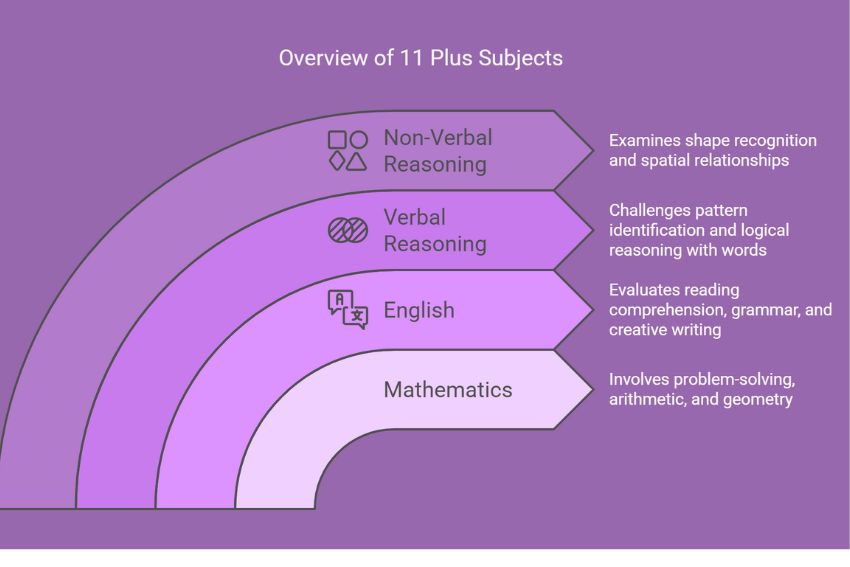Preparing for the 11 Plus exams can feel overwhelming at first. After all, children aged 10-11 face an important challenge. They aim to secure a spot in grammar schools or selective secondary schools. Passing this exam requires careful planning, consistent preparation, and the right strategies. For parents, it’s natural to wonder, “Where do we start?” or “How can I help my child succeed?”
Fortunately, we’re here to guide you through every step of the process. Whether it’s creating a study plan, practising past papers, or managing stress, we’ll share practical tips to set your child up for success. By following these strategies, the preparation process can become much smoother and more manageable.
- Understanding the 11 Plus Exams
- The Parent’s Role: Why Starting Early Matters for 11 Plus Exams
- Building a Study Plan For 11 Plus Exams
- Mock Exams for the 11 Plus: Why They Matter
- Tips for Each 11 Plus Subject
- How to Manage Time and Stay Focused During the 11 Plus Exams
- When to Apply for the 11 Plus Exams?
- Must-Have Resources for Passing the 11 Plus Exams
- Conclusion
- FAQ's
Understanding the 11 Plus Exams
The 11 Plus exam is more than just a test. it’s a gateway to grammar schools and selective secondary schools. Understanding the exam structure and what it involves is the first step to success for both students and parents.
The exam typically covers four main subjects: Mathematics, English, Verbal Reasoning, and Non-Verbal Reasoning. Each subject tests different skills:

11 Plus Exam Format
The format of the 11 Plus exam depends on the exam board used by your chosen school. The two main providers are:
GL Assessment: Known for multiple-choice questions in all subjects, including separate sections for verbal and non-verbal reasoning.
CEM (Centre for Evaluation and Monitoring): Includes a mix of multiple-choice and written responses, often with a greater focus on problem-solving and comprehension.
Each section is usually timed, testing both knowledge and speed. Some schools may also include additional tests or interviews, so it’s important to check the specific requirements of the schools you’re applying to. Parents should check the specific requirements of their target schools, as they may have different rules or extra tests.
The Parent’s Role: Why Starting Early Matters for 11 Plus Exams
Now that you understand the structure of the 11 Plus exam, it’s time to focus on preparation. Starting early is one of the best ways to help your child prepare for the 11 Plus exam. As a parent, you play a key role in creating an organised and supportive environment that sets your child up for success. Here’s how starting early can make a difference:
- Plan Effectively – starting early gives you time to gather the right resources, such as practice papers and study guides, without rushing. You can also create a realistic study plan that fits your child’s learning pace and schedule.
- Spot Weak Areas – early preparation allows you to identify where your child needs extra help, whether it’s a particular subject or skill. You’ll have time to arrange tutoring or focus more on challenging topics.
- Reduce Stress – with more time to prepare, you can help your child tackle the syllabus step by step, reducing last-minute pressure. A steady routine with breaks ensures your child stays motivated and avoids burnout.
- Build Confidence – early practice helps your child feel familiar with the exam format and more confident about their abilities. You can provide encouragement and celebrate small wins along the way.
You’re giving your child the best chance to succeed while keeping the process manageable for both of you. Let’s move on to creating a study plan that works for your child!
Building a Study Plan For 11 Plus Exams
Once you’ve started early, the next step is creating a study plan that works for your child. A well-organised plan helps your child focus on key areas, stay consistent, and make steady progress. As a parent, you can play a vital role in structuring this plan to suit your child’s needs.
Steps to Create an Effective Study Plan
| Steps | What To Do | Details |
| Break Down the Syllabus | Divide the syllabus into manageable sections: Mathematics, English, Verbal Reasoning, and Non-Verbal Reasoning. | Focus on one subject at a time to prevent overwhelm. |
| Set Realistic Goals | Plan short-term goals like completing one practice paper a week or mastering a specific topic. | Celebrate small wins to boost motivation. |
| Create a Weekly Schedule | Assign specific days to each subject (e.g., English on Mondays, Mathematics on Tuesdays). | Include time for revision, mock exams, and breaks for balance. |
| Incorporate Regular Practice | Make practice papers and mock exams a key part of the plan | These help your child apply what they’ve learned and track progress. |
Tips for Parents
1 Tip: Be supportive but not overly controlling. Let your child take ownership of their learning.
2 Tip: Provide a quiet, distraction-free space for study sessions.
3 Tip: Monitor progress regularly and encourage open communication about what’s working and what’s not. Be flexible. Adjust the study plan as needed, based on your child’s strengths and areas for improvement.
Mock Exams for the 11 Plus: Why They Matter
Practising with mock exams is one of the most important ways to prepare for the 11+ exam. It not only helps students get familiar with the test format but also builds confidence and improves performance over time.
Time Each Section – mimic the exact timing of the exam for each subject. This helps students practise working under pressure and ensures they complete all questions within the given time.
Use Realistic Materials – use practice papers from trusted sources that reflect the exam board format, such as GL Assessment or CEM.
Switch Between Multiple-Choice and Written Answers – If your child’s exam includes both question types, alternate between the two during mock exams. For multiple-choice questions, practise eliminating incorrect answers quickly. For written sections, focus on clear, concise responses.
Review Mistakes Together – after each mock exam, go through the answers to identify areas for improvement. Focus on specific question types or topics where errors occur most often.

As a Parent How Can I Help My Child Prepare for 11+ Mock Exams?
Create a Quiet, Distraction-Free Environment: Set up a calm space for your child to practise. Make sure it mimics the actual exam setting as closely as possible, with no interruptions or distractions.
Use Results to Plan Ahead: Review your child’s mock exam results to identify patterns. Are there specific topics or question types they’re struggling with? Use this information to adjust their study plan and focus on weak areas.
Offer Encouragement: Acknowledge their effort and progress, even if the results aren’t perfect. Positive reinforcement keeps your child motivated and reduces exam-related stress.
Tips for Each 11 Plus Subject
Doing well in the 11 Plus exams means focusing on each subject. Whether it’s Maths, English, Verbal Reasoning, or Non-Verbal Reasoning, knowing how to approach each one is key.
Mathematics
- Practise problem-solving questions regularly, focusing on key areas like arithmetic, geometry, and word problems.
- Break down complex problems into smaller steps to simplify the process.
- Use interactive platforms or apps to make practising maths engaging and fun.
- Memorise essential concepts, such as multiplication tables, through flashcards or quick quizzes.
English
- Strengthen reading comprehension skills by working with a variety of texts, such as stories, articles, and poetry.
- Build vocabulary by learning new words daily and practising them in sentences.
- Write short essays or creative pieces to develop writing skills and learn how to structure ideas clearly.
- Discuss books, articles, or stories to encourage critical thinking and deeper understanding.
Verbal Reasoning
- Practise word-based puzzles and logical reasoning questions to build speed and accuracy.
- Identify patterns in letters, words, and numbers by completing regular exercises.
- Use logic-based games, riddles, and crosswords to make learning enjoyable and interactive.
Non-Verbal Reasoning
- Focus on recognising patterns, shapes, and sequences by practising with past papers or workbooks.
- Solve questions under timed conditions to improve confidence and exam readiness.
- Use visual aids, like puzzles or pattern-matching games, to simplify abstract concepts and reinforce understanding.
How to Manage Time and Stay Focused During the 11 Plus Exams
Learning time management and exam techniques is a must for succeeding in the 11 Plus exams. These skills help students stay focused, manage pressure, and maximise their performance during the test.

Time Management Tips
Start with Easier Questions:
Encourage your child to answer the easier questions first. This way, they can secure marks quickly and save time for the tougher ones.
Practise with Timers:
Set up timed practice sessions at home to help your child get used to working within exam time limits. Practising under real exam conditions builds confidence and ensures they can complete all sections.
Staying Calm and Focused
Move On if Stuck:
Teach your child to skip a question if it’s taking too long and return to it later. This reduces stress and saves valuable time.
Use Positive Visualisation:
Encourage your child to imagine themselves doing well in the exam. This boosts motivation and helps them stay calm. Simple techniques like deep breathing can also help them refocus if they feel anxious.
Focusing on time management and staying calm, your child will feel more confident and ready to take on the 11 Plus exam. Next, let’s look at how past papers can enhance their preparation.
When to Apply for the 11 Plus Exams?
if you want to apply for 11 Plus exams you have to know that most grammar schools begin their registration between March and May. As for registration periods it typically closes between June and July.
The majority of 11 Plus exams are administered in September. Specific dates can vary by region and school. For instance, the Slough Consortium schedules their exam on September 21st.
11+ Results Release
Results are generally released by mid-October, allowing parents to make informed decisions before the secondary school application deadline on October 31st.
These dates may vary depending on the grammar school or consortium. Make sure to check the exact dates for your chosen schools to register and prepare on time.
Must-Have Resources for Passing the 11 Plus Exams
Passing 11 Plus exams are much more easier with right materials. Having access to right practice materials can make a big difference. Here we offer you some must-have resources to help your child succeed:
Books and Study Guides
Bond 11+ Series: Offers in-depth coverage of topics like Mathematics, English, Verbal, and Non-Verbal Reasoning.
CGP 11+ Study Guides: Simplifies complex topics and provides plenty of practice questions.
Practice Papers: Past papers are important for understanding the exam format and question types. They help students practise under timed conditions and refine their techniques.
Interactive Learning Tools For 11 Plus Exams
Quizlet: Allows students to create flashcards and quizzes to improve vocabulary and reasoning skills.
Kahoot: Offers interactive quizzes and games that make learning fun and collaborative.
BBC Bitesize: A trusted source for covering foundational concepts in Mathematics and English.
Conclusion
Passing the 11 Plus exam is challenging, but with the right mindset, it’s definitely achievable. By starting early, creating a solid study plan, practising regularly, and using high-quality resources, your child can feel confident and well-prepared for the big day, and even aim for high scores in 11 plus, that improve their chances of getting into top grammar schools.
As a parent, your guidance and encouragement plays a big role in this process. Stay involved, celebrate your child’s progress, and address challenges as a team. Remember, the goal isn’t just to pass the exam -it’s also about equipping your child with valuable skills and confidence for the future.
If you’re seeking online tutoring for the 11 Plus, they can provide support to make preparation more effective and personalised. With professional guidance, your child can overcome challenges and stay on track throughout their preparation. Best of luck !
FAQ’s
What is a good score for 11+?
A good score in the 11 Plus depends on the school or area your child is applying to. For most grammar schools, a standardised score between 115 and 121 is considered strong. However, each school or consortium determines its own benchmark for a “pass” or qualifying score.
How difficult is 11+?
The 11 Plus exam is challenging as it tests advanced skills in Maths, English, Verbal, and Non-Verbal Reasoning, with high competition for grammar school places. However, with proper preparation and support, it’s manageable.
What is the hardest topic in the 11+?
The hardest topic in the 11+ varies by student, but many find Non-Verbal Reasoning challenging due to its abstract patterns and logic-based questions, which require strong problem-solving skills and quick thinking under timed conditions.
What's easiest subject in the 11+ exam?
The easiest subject in the 11+ exam varies depending on the student’s strengths. However, English is often considered more straightforward for students who read widely and have a good grasp of vocabulary and comprehension skills.








